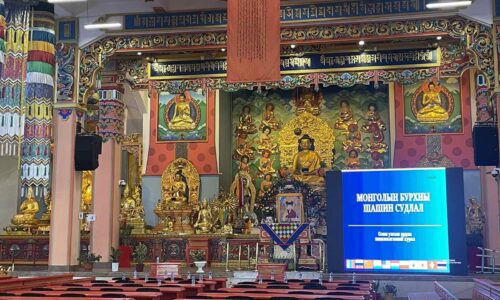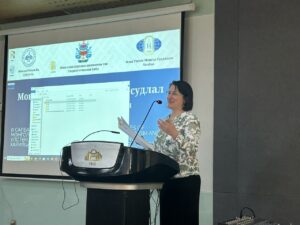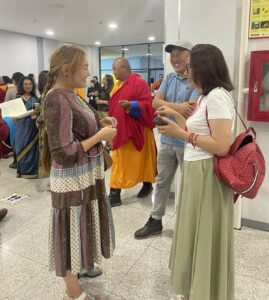
The first day of the international conference titled “Study of Mongolian Buddhism” has successfully concluded
The biennial conference on various themes in religious studies organized by the Department of Philosophy and Religious Studies at NUM has been elevated to an international level this year. It is being held under the title ‘Study of Mongolian Buddhism’ in collaboration with the International Association of Mongol Studies and Gandan Tegchenling Monastery, the Centre of Mongolian Buddhism.
In his greeting to the conference attendees, President Khurelsukh Ukhnaa of Mongolia highlighted the significant contributions of Mongolia’s forebears in researching, developing, and disseminating Buddhist knowledge globally, as well as in creating an array of collected works and establishing a distinct Mongolian form of Buddhism. He noted that this area of study is undergoing significant advancement in the 21st century. Expressing his deep appreciation for the scholars who have dedicated their wisdom and writings to advancing the study of Mongolian Buddhism and elevating its research standards, he offered his auspicious blessing that the study of Buddhism that aims to purify the soul and enlighten the mind, may flourish timelessly.
The international conference was officially inaugurated by the esteemed head of Gandan Tegchenling Monastery, Nomun Khan, and Geshe Lharampa Venerable Javzandorj Dulamragchaa, who acknowledged the contributions of generations of monks to the development of Mongolian Buddhism as an international study topic and provided his blessings for the conference’s success. Prof., Dr. Zayaabaatar Dalai, Director of the School of Arts and Sciences at NUM, General Secretary of the International Association of Mongol Studies, stressed that this conference on the ‘Study of Mongolian Buddhism’ marks the beginning of an annual series of international conferences in Mongolia, which the association is planning.
In the keynote address entitled “Study of Mongolian Buddhism: Present and Future” Prof., Dr. S. Yanjinsuren from the Department of Philosophy and Religious Studies at NUM presented the findings of her research on the spiritual transformations among Mongolians and highlighted specific texts and practices, such as worships and offerings for mountains that define Mongolian Buddhism’s identity. Additionally, Gavj S. Gantumor, Vice Abbot of Gandan Tegchenling Monastery, in his presentation “The Contribution of Mongolian High Lamas to the Glorious Nalanda Tradition”, explored the significance of the Nalanda tradition, its teaching methods, foundational texts, and the contributions of Mongolian monks to its literature.
The afternoon sessions of the conference unfolded over four thematic areas, namely, Studies of Buddhist Knowledge and Manuscripts in Mongolia; Studies of the History of Mongolian Buddhism, Incarnations, Buddhist Masters, Monasteries, and Rituals; Studies of Mongolian Buddhism and Politics, Law, and International Relations; and Studies of the Current Situation and Trends of Mongolian Buddhism. Lively debates and discussions wrapped up successfully the first day of the international conference.
Today’s sessions are taking place in the NUM Library lecture halls, featuring presentations on topics such as “On the Erdene Sastir or Introduction to Buddhism Compiled by Zaya Pandida Namkhaijamts,” “Determination of Lands of Some Khutugtus of Sain Noyon Aimag,” and “A Study of the Application of Nalanda Mahavihara’s Reductionism, Pragmatism, and Practice-Orientedism for Buddhist Propagation in Modern Mongolia and Korea.”
The conference will continue throughout the day.




